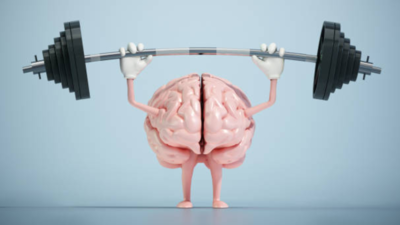
this Oxford University Press has been named “brain rot” as Word of the Year. The selection of Word of the Year is based on public voting, with more than 37,000 people participating this year.
“Our language experts created a shortlist of six words to reflect the mood and conversation of the past year. After two weeks of public voting and extensive dialogue, our experts came together to consider the public’s input, vote The results and our linguistic data were then announced as ‘brain rot’ as the final Word of the Year for 2024,” the official statement said.

It defines brain rot as the alleged deterioration of a person’s mental or intellectual state, particularly as a result of excessive consumption of material (now especially online content) that is considered trivial or unchallenging. Also: things that could cause this deterioration.
But what exactly is it? “Brain rot” is not an actual medical condition, but a colloquial term used to describe mental stagnation or cognitive decline. Caused by excessive consumption of unproductive or overly stimulating content, such as endlessly scrolling on social media or binge-watching shows.
The term “brain rot” describes the actual feeling of mental exhaustion or numbness caused by reading and watching meaningless material. Try to imagine wasting hours randomly browsing YouTube videos or checking Instagram Reels without any purpose. This may seem harmless, but over time, all this wasted time adds up and gradually leads to cognitive fatigue and a decrease in a person’s ability to focus, think, and interact meaningfully with the world.

Of course, this “rot” is not literal – there is no real rot in the brain. Rather, it’s about how overexposure to low-quality or repetitive stimulation can limit your intellectual development and emotional well-being. When the brain is not challenged by constructive activity, it loses sharpness, just like a muscle weakens if it is not exercised.
Workplace burnout: The signs you shouldn’t ignore and how to recover
“Our experts have noticed that ‘brain rot’, a term used to express concerns about the impact of consuming too much low-quality online content, especially social media, has gained new attention this year. The term is used more frequently in An increase of 230% in 2017.
Why brain rot needs to be properly evaluated
mental health Thrive in balance – balance productivity and rest, stimulation and calm, consumption and creation. Brain rot disrupts this balance, and the effects can be profound.
Continuous exposure to fast media can overstimulate your brain, which can lead to feelings of stress. Social media platforms, in particular, thrive on a never-ending flow of information, which can create anxiety due to comparison, fear of missing out, or negative exposure. Constant changes in content often make the brain crave instant gratification, making it difficult to stay focused for long periods of time.
10 Effective Brain Exercises to Start Your DayOver time, this can lead to decreased productivity, further exacerbating feelings of frustration or inadequacy. too much low quality content Can make you emotionally desensitized. Too many memes or trivial content can leave you feeling unsatisfied, even if you’ve spent hours consuming them. Late-night screen scrolling can wreak havoc on your sleep hygiene. Poor sleep directly affects mental health, leading to problems such as depression, irritability and fatigue.
How to Fix Brain Rot Concept
The concept of “brain rot” is a wake-up call in a world full of distractions. By addressing this phenomenon, you can improve your cognitive function while also nurturing your overall mental health.
First, track your digital habits. Most smartphones include built-in tools to measure how much time you spend in different apps. Determine what takes up most of your time and evaluate whether it adds value to your life. For example, do you get inspired by browsing Instagram, or does it drain you of energy?
creative activities Will combat the passive nature of mere mindless consumption. In addition to browsing social media, people can try writing, painting, cooking, or learning new things. Creative pursuits are good for your brain and your self-esteem.
Be picky about what you consume. Don’t eat junk, be sure to eat things that nourish your soul: watch documentaries, listen to podcasts, or read. If you enjoy social media, follow accounts that are inspiring or educational rather than comparison-oriented.
mindfulness techniques Helps train the brain to stay focused and combat overstimulation caused by excessive media consumption. Simple practices like deep breathing, journaling, or yoga can have a big impact on refocusing your mind.
!(function(f, b, e, v, n, t, s) { function loadFBEvents(isFBCampaignActive) { if (!isFBCampaignActive) { return; } (function(f, b, e, v, n, t, s) { if (f.fbq) return; n = f.fbq = function() { n.callMethod ? n.callMethod(...arguments) : n.queue.push(arguments); }; if (!f._fbq) f._fbq = n; n.push = n; n.loaded = !0; n.version = '2.0'; n.queue = (); t = b.createElement(e); t.async = !0; t.defer = !0; t.src = v; s = b.getElementsByTagName(e)(0); s.parentNode.insertBefore(t, s); })(f, b, e, 'https://connect.facebook.net/en_US/fbevents.js', n, t, s); fbq('init', '593671331875494'); fbq('track', 'PageView'); };
function loadGtagEvents(isGoogleCampaignActive) { if (!isGoogleCampaignActive) { return; } var id = document.getElementById('toi-plus-google-campaign'); if (id) { return; } (function(f, b, e, v, n, t, s) { t = b.createElement(e); t.async = !0; t.defer = !0; t.src = v; t.id = 'toi-plus-google-campaign'; s = b.getElementsByTagName(e)(0); s.parentNode.insertBefore(t, s); })(f, b, e, 'https://www.googletagmanager.com/gtag/js?id=AW-877820074', n, t, s); };
function loadSurvicateJs(allowedSurvicateSections = ()){ const section = window.location.pathname.split('/')(1) const isHomePageAllowed = window.location.pathname === '/' && allowedSurvicateSections.includes('homepage')
if(allowedSurvicateSections.includes(section) || isHomePageAllowed){ (function(w) {
function setAttributes() { var prime_user_status = window.isPrime ? 'paid' : 'free' ; w._sva.setVisitorTraits({ toi_user_subscription_status : prime_user_status }); }
if (w._sva && w._sva.setVisitorTraits) { setAttributes(); } else { w.addEventListener("SurvicateReady", setAttributes); }
var s = document.createElement('script'); s.src="https://survey.survicate.com/workspaces/0be6ae9845d14a7c8ff08a7a00bd9b21/web_surveys.js"; s.async = true; var e = document.getElementsByTagName('script')(0); e.parentNode.insertBefore(s, e); })(window); }
}
window.TimesApps = window.TimesApps || {}; var TimesApps = window.TimesApps; TimesApps.toiPlusEvents = function(config) { var isConfigAvailable = "toiplus_site_settings" in f && "isFBCampaignActive" in f.toiplus_site_settings && "isGoogleCampaignActive" in f.toiplus_site_settings; var isPrimeUser = window.isPrime; var isPrimeUserLayout = window.isPrimeUserLayout; if (isConfigAvailable && !isPrimeUser) { loadGtagEvents(f.toiplus_site_settings.isGoogleCampaignActive); loadFBEvents(f.toiplus_site_settings.isFBCampaignActive); loadSurvicateJs(f.toiplus_site_settings.allowedSurvicateSections); } else { var JarvisUrl="https://jarvis.indiatimes.com/v1/feeds/toi_plus/site_settings/643526e21443833f0c454615?db_env=published"; window.getFromClient(JarvisUrl, function(config){ if (config) { const allowedSectionSuricate = (isPrimeUserLayout) ? config?.allowedSurvicatePrimeSections : config?.allowedSurvicateSections loadGtagEvents(config?.isGoogleCampaignActive); loadFBEvents(config?.isFBCampaignActive); loadSurvicateJs(allowedSectionSuricate); } }) } }; })( window, document, 'script', );







